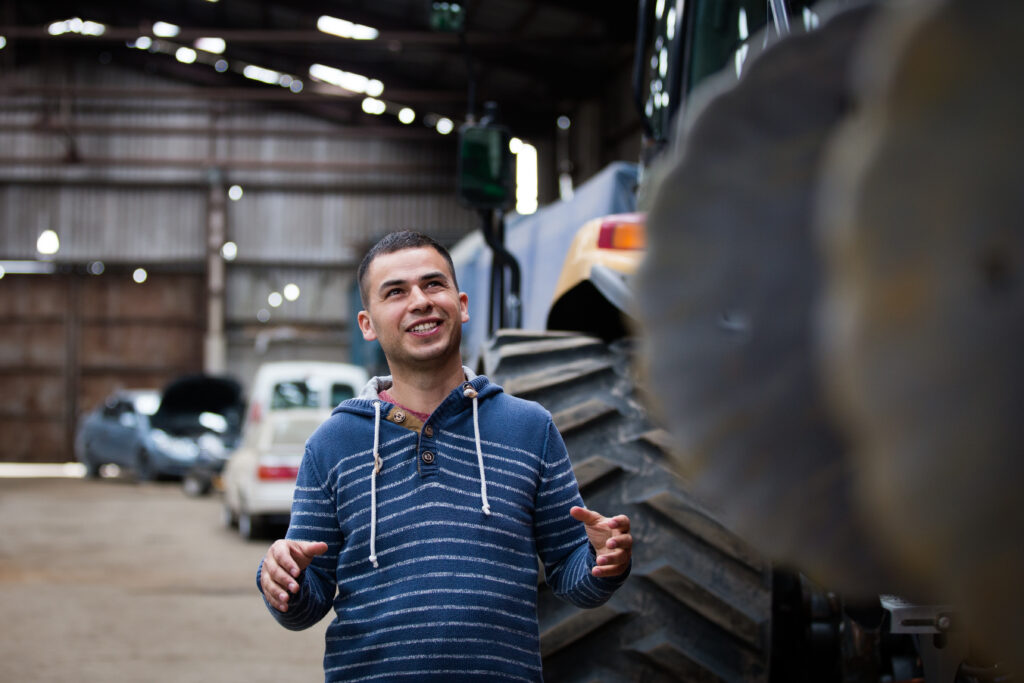When Rihards Kadirovs got the opportunity to start his own farm in 2005, he didn’t hesitate. He began working the land in parallel with his university studies and, after graduation, it became a full-time job. Today, the first-generation farmer combines his economics background with a love of farming and future-forward thinking.
It was anything but easy in the beginning, however. The farm’s location on a hill and it’s naturally dense, 80% clay soil, which has been plowed heavily by previous farmers, made it highly vulnerable to erosion.
“I was using conventional methods and ploughing my land, which was already in poor condition”, says Rihards. “I quickly realized that I wasn’t getting good results with traditional techniques and something had to change.”
I quickly realized that I wasn't getting good results with traditional techniques and something had to change.
After researching various methods, Rihards came across the strip-till system and decided to give it a try. A hybrid between full-till and no-till, strip-till only disturbs the strip of soil that is sowed while leaving the rest intact.
“I’ve had nothing but positive results from the strip-till system,” says Rihards, who is only the second farmer in Latvia to adopt the system. “It has increased my harvest, the quality of my soil, and the quality of life around the farm.”

Since the system was adopted in 2015, fertilizer and pesticide requirements have significantly reduced. And, after four years, the harvest increased by 90%, while the soil’s phosphorous and nitrogen levels dropped.
“Even the surface structure has radically changed,” says Rihards. “After a couple more years of strip-till, when the soil has returned to a completely healthy state, I may even be able to start using the no-till system.”
Additionally, using the strip-till system has led to a more even distribution of moisture and more consistent crop quality across the hill-sloped fields. Rihards has also benefited from cost savings related to reduced machine and labor needs.
Well aware of the impact his farm has on the environment, Rihards also practices soil liming and uses buffer zones and catch crops to further prevent nutrient runoff.
Today, Rihards uses what he’s learned to inspire others. He regularly organises open farm days and facilitates a WhatsApp group to engage with other farmers interested in strip or no-till systems.
In 2019, Rihards Kadiirovs received the national Baltic Sea Farmer of the Year award in recognition of his efforts to reduce nutrient runoff on his farm.
FARM FACTS
- Location: Sala Parish in central Latvia
- Type of farm: Conventional crop farm. (450 ha)
- Main product: Various crops including winter wheat, beans, rye, and summer rapeseed
- Key practices: Buffer zones, catch crops, minimum tillage, structural liming of soils
- National jury motivation: “Rihards Kadirovs, who runs Jaunozoli Farm, is nothing short of an inspiration. His enthusiasm and love for the environment are truly wonderful to witness. With striptill he has reduced the amount of machinery, and therefore the amount of fuel and emissions. He is also studying and practicing crop rotation and the relationship between different crops to increase the quality of his soil and harvest. On top of that, his soil is absorbing large amounts of CO2, and he has created buffer zones that help reduce nutrient runoff and serve as important habitats. He’s experimenting with killing the weeds using electricity so that he can stop using herbicides altogether. He is also continuously attending seminars, participating in forums, and joining projects so that he can learn more, and improve further.”

